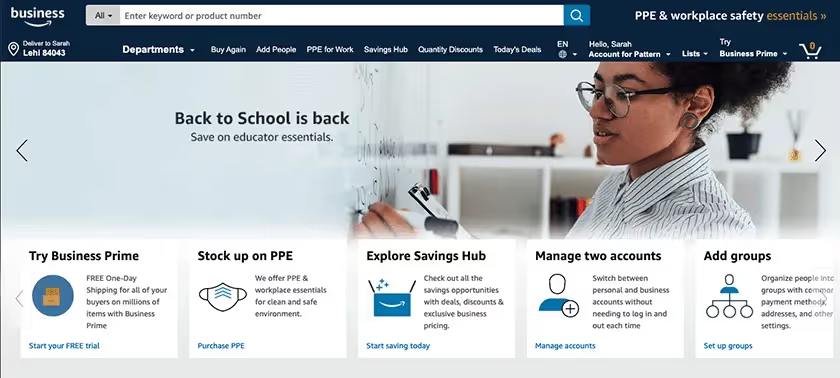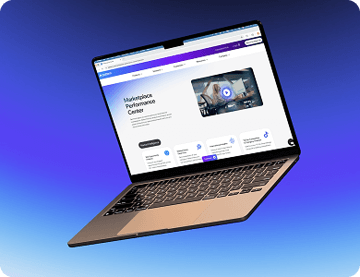Amazon Business: What You Need to Know
Amazon Business looks and operates like Amazon.com, but offers additional features to help B2B buyers run their business more economically. Learn more with Pattern.
Amazon Web Services (AWS), Audible, Amazon Advertising, and Amazon.com–Which of these do you think is Amazon’s fastest growing channel? Did you say Amazon.com? Think again. While Amazon.com is pulling huge numbers year over year and continues to be a dominating force for business, the company’s fastest growing channel is a relative newcomer that has quietly slipped into the main lexicon of B2B sales and become a powerhouse that sellers and buyers alike should be watching closely: Amazon Business.
What is Amazon Business?
Just as its name suggests, Amazon Business is an Amazon marketplace exclusively for businesses. It looks and operates like Amazon.com, but offers additional features to help B2B buyers run their business more economically. B2B buyers are able to procure hundreds of millions of products on Amazon Business, many of which cannot be found on Amazon’s other channels. These products include IT products, janitorial products, medical supplies, restaurant supplies, office supplies, and other materials they may need for their staff and site.

Amazon Business is a fairly new addition to Amazon and the B2B space. It was launched in 2015, and has since undergone rapid growth. It’s important to note that Amazon Business isn’t just an experiment or backburner channel for Amazon. Former Amazon CEO Jeff Bezos has made it clear that Amazon Business is a priority as the company looks to expand, and the numbers paint a clear picture of why.
Three years after it launched, Amazon Business surpassed $10 billion in annualized sales. The channel hit $25 billion in worldwide annualized sales in May 2021, and their gross sales grew 2.9 times faster than the total sales for Amazon.com, according to Digital 360. More than half of that comes from third-party sellers, who have the unique opportunity to sell to larger corporations through Amazon Business. Amazon Business is currently available in the U.S., U.K., France, Germany, Italy, Spain, India, and Japan. Business Prime is currently more limited.
What are the benefits of Amazon Business?
In addition to a wide product selection, the Amazon Business platform offers several unique perks for businesses. For example, business buyers have access to multiple-user accounts (this means they can connect their entire team to the platform), exclusive business-only discounts on products, bulk discounts on products, pallet deliveries, time saving features to help them run their business more effectively, and the option to sign up for a Business Prime membership. Similar to Amazon Prime, Business Prime members pay a membership fee that gives them access to exclusive services like free same-day, one-day, or two-day shipping on eligible products.
How does Amazon Business work?
Amazon Business is a bit like the dark web of Amazon, because regular users can’t just find its storefront by searching for it or stumbling upon it. Getting on Amazon Business requires approval from Amazon. Just like on Amazon’s main channel, businesses can create an account on Amazon Business and join for free. Once a business has created an account and been verified by Amazon, they can then access the Amazon Business storefront. Imagine how Amazon.com works and you’ll have a great idea of how Amazon Business works: they’re essentially the same. Buyers can add products to their cart, select whether or not it’s a recurring delivery, and purchase products the same way they would on Amazon.com.
Why should B2B tech and other industries be selling on Amazon Business?
Buyer behavior has changed dramatically over the past few years, and B2B buyer behavior and business procurement is no exception. B2B buyers and business managers of today are largely tech-savvy millennials who want to buy products for their business the same way they’re buying products for themselves: totally online, without having to speak to a middleman, and without waiting weeks for their products to be shipped to them. These buyers are looking for something familiar that’s efficient and easy to use.
Doing things the traditional way, such as buying directly through a VAR, isn’t cutting it anymore. B2B brands should be selling on Amazon Business simply because that’s where their customers are and how their customers want to make their purchases. As of May 2021, Amazon Business was serving over five million businesses, and the B2B ecommerce sector at large is projected to increase to $1.8 trillion come 2023.
There is a plethora of opportunity in the online B2B space right now, and suppliers who want to grow are going to need to adapt quickly to capture this growing revenue stream. Another reason why B2B companies should be selling on Amazon Business is because their products are likely already being sold there, and without some kind of control or oversight brands can run into brand protection and reputation problems.
VARs and other third party sellers are aware of the potential that Amazon Business has for business, and when given the opportunity, many of them are flocking to Amazon to list products. The issue is that most VARs cannot be both a good traditional seller and a good Amazon seller. While they might be experts at offline sales, they’re likely not familiar with or well-tuned to the complexities of selling on Amazon. This may lead to product listings that don’t follow basic practices (like having good images and clear, concise product descriptions), poorly selected keywords, inconsistent pricing, and a lack of thought put into overall brand messaging.
This will reflect poorly on the product and the manufacturer in addition to the seller, meaning the brand is hurt without any say. Having a presence on Amazon Business allows you to tidy up your brand messaging, regain control, and ensure that no matter who is selling your product, the B2B customer experience remains exceptional.
Sell on Amazon Business with Pattern
Now is an exciting time to be a B2B seller, and Amazon Business is making the B2B experience more streamlined and lucrative than ever. Brands looking for opportunities to grow should be looking at Amazon Business yesterday and partnering with VARs who can help them leverage the platform to their advantage. If you’re interested in learning more about an Amazon-experienced VAR or how Pattern can help your B2B tech brand excel on Amazon, request a demo and see how our experts can upgrade your marketplace offering.


.jpg)







.jpg)